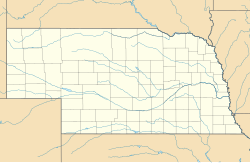Starke Round Barn | |
 | |
| Nearest city | Red Cloud, Nebraska |
|---|---|
| Coordinates | 40°5′8.6″N98°26′12.2″W / 40.085722°N 98.436722°W |
| Area | 2 acres (0.81 ha) |
| Built | 1902 |
| Built by | Starke, Conrad, et al. |
| NRHP reference No. | 72000761 [1] |
| Added to NRHP | March 16, 1972 |
The Starke Round Barn near Red Cloud, Nebraska, United States, is a round barn that was built in 1902. It was listed on the National Register of Historic Places in 1972. [1]
The barn has been restored and now holds tours on request. [2]

